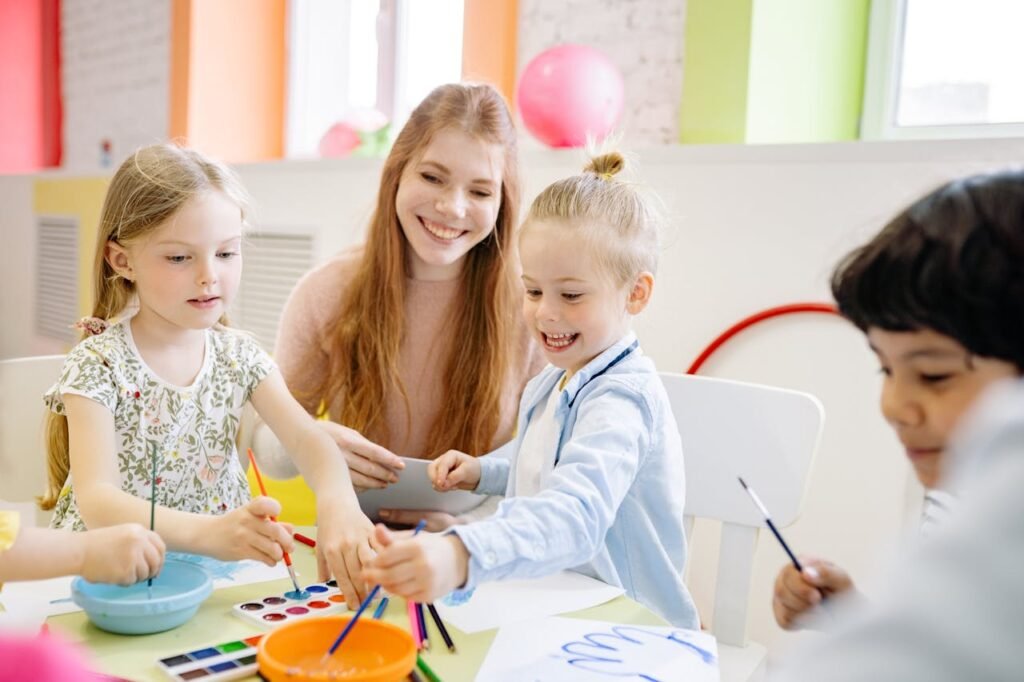
Introduction
Teacher-child relationships are key to early childhood education (ECE), influencing how children learn, interact, and grow. Positive bonds between teachers and students foster a nurturing classroom environment, boosting children’s motivation, confidence, and engagement. Teachers, in turn, benefit from increased job satisfaction and reduced stress.
This blog explores the significance of these relationships, what influences them, and how educators can strengthen them.The BEST Teacher Training Institute, Best ECCEd, Best Jolly Grammar, and Best Jolly Phonics in Mumbai Borivali offer programs to help teachers build strong connections with their students.

The Importance of Positive Relationships
In early childhood education, relationships are the foundation upon which all learning and development are built. Children feel safer, respected, and valued when their teachers are supportive, which encourages them to learn and explore. Emotional security, in particular, is a critical factor in a child’s ability to learn and thrive.

Benefits for Children:
- Emotional security and well-being: A trusting relationship with a teacher provides children with a sense of safety. This emotional security allows them to explore new concepts, experiment with ideas, and participate actively in classroom activities without fear.

- Increased motivation and engagement: Children are naturally more inclined to engage with learning when they feel supported and valued by their teachers. This connection enhances their motivation to participate, learn, and challenge themselves.

- Improved social skills: Positive interactions with teachers help children develop better communication and cooperation skills. As they observe and mimic positive behavior, children learn how to navigate social situations and build meaningful connections with their peers.
- Enhanced cognitive development: The emotional and social benefits of strong teacher-child relationships can directly impact cognitive growth. Children who feel supported are more likely to be curious, attentive, and focused—key ingredients for cognitive development.

Benefits for Teachers:
- Job satisfaction: Teachers who build strong, positive relationships with their students often experience a greater sense of fulfillment in their work. These connections create a more harmonious classroom environment, which makes teaching more rewarding.
- Increased effectiveness: Positive relationships lead to better classroom management and more successful teaching outcomes. Students who feel understood and supported are more likely to learn and perform better.
- Reduced stress: Establishing meaningful relationships with students can help reduce stress for teachers. A positive and supportive classroom environment reduces behavioral problems and boosts teacher confidence.
These benefits underscore the critical importance of teacher-child relationships in the early years of education. Professional development programs, such as those offered by the Best ECCEd Teacher Training Institute in Mumbai Borivali, equip educators with the skills to nurture these relationships and enhance both the learning experience for children and the teaching experience for educators.

Factors Contributing to Positive Relationships
While building strong teacher-child relationships is essential, it doesn’t happen automatically. Several key factors contribute to the quality of these interactions, each requiring intentionality and reflection on the part of the teacher.

- Sensitivity and responsiveness: A teacher’s ability to recognize and respond to the emotional and developmental needs of a child is at the heart of a positive relationship. Being attuned to children’s feelings, offering comfort when needed, and adjusting teaching strategies based on individual needs can foster trust and security.
- Respect and empathy: Treating children with respect, acknowledging their emotions, and showing empathy is vital for building a strong rapport. Understanding a child’s perspective helps create a nurturing environment where they feel heard and valued.

- Communication: Open, clear, and effective communication is key to forming strong connections. Active listening, positive language, and age-appropriate discussions help build mutual respect and understanding between teachers and students.
- Trust and rapport: Trust is the foundation of any positive relationship. Building rapport with children requires consistency, reliability, and a genuine interest in their well-being. Once trust is established, children are more likely to engage openly and confidently in the classroom.
- Cultural sensitivity: Teachers must be aware of and respectful of the diverse cultural backgrounds of their students. Recognizing and honoring a child’s cultural identity strengthens the bond between teacher and student, making the classroom a more inclusive and welcoming place.
These factors form the bedrock of positive teacher-child relationships. Training programs at the Best Jolly Grammar Teacher Training Institute in Mumbai Borivali and Best Jolly Phonics Teacher Training Institute in Mumbai Borivali emphasize the importance of these qualities in building a strong foundation for effective teaching.

Strategies for Building Positive Relationships
Developing strong teacher-child relationships requires ongoing effort and attention. Teachers can implement several strategies to foster positive connections and create a nurturing learning environment.
- Individualized attention: Spending one-on-one time with each child allows teachers to build deeper connections and better understand their individual needs and preferences. This personalized attention can be as simple as asking about their interests or providing tailored support during activities.
- Positive reinforcement: Recognizing and praising a child’s efforts, no matter how small, reinforces positive behavior and fosters self-confidence. Children thrive on encouragement, and teachers can use this strategy to motivate students and strengthen the relationship.

- Active listening: Listening to a child’s thoughts and feelings without interruption fosters a sense of trust and validation. It shows that the teacher values the child’s perspective, which strengthens the emotional bond between them.
- Collaborative problem-solving: Involving children in finding solutions to conflicts or challenges promotes a sense of agency and cooperation. When teachers work together with children to resolve issues, it encourages mutual respect and strengthens the teacher-child relationship.
- Modeling positive behavior: Teachers who model respectful, caring, and empathetic behavior set a powerful example for their students. Children often mimic the behavior of adults around them, so demonstrating kindness, patience, and understanding can foster a similar approach among the students.
Institutes like the BEST Teacher Training Institute in Mumbai Borivali provide educators with practical strategies and hands-on training to ensure they can build strong relationships in their classrooms.

Conclusion
Teacher-child relationships are the cornerstone of early childhood education. When these relationships are strong, children benefit emotionally, socially, and cognitively, while teachers experience greater job satisfaction and reduced stress. The positive impact of these relationships on early learning cannot be overstated, and educators need to prioritize building and maintaining these connections.
To continue fostering these meaningful relationships, teachers must receive ongoing professional development and support. Programs at the Best ECCEd Teacher Training Institute in Mumbai Borivali, Best Jolly Grammar Teacher Training Institute in Mumbai Borivali, and Best Jolly Phonics Teacher Training Institute in Mumbai Borivali are designed to equip educators with the skills, knowledge, and strategies necessary to nurture these essential bonds, paving the way for a brighter future for children in early childhood education.


